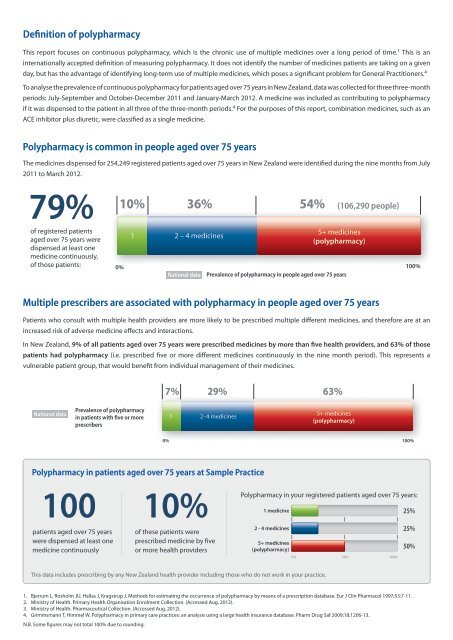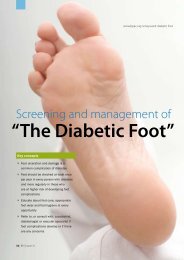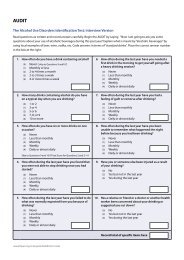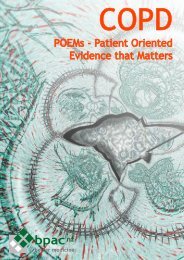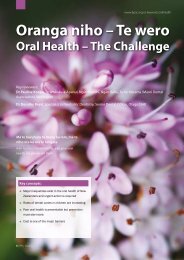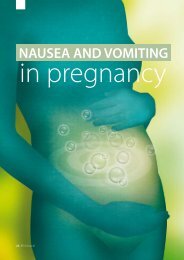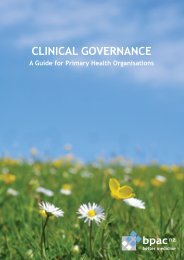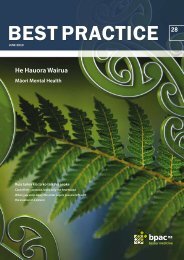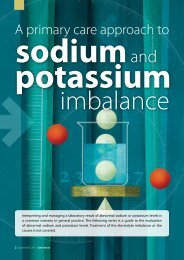View / Download pdf version of this report - Bpac.org.nz
View / Download pdf version of this report - Bpac.org.nz
View / Download pdf version of this report - Bpac.org.nz
- No tags were found...
Create successful ePaper yourself
Turn your PDF publications into a flip-book with our unique Google optimized e-Paper software.
Definition <strong>of</strong> polypharmacyThis <strong>report</strong> focuses on continuous polypharmacy, which is the chronic use <strong>of</strong> multiple medicines over a long period <strong>of</strong> time. 1 This is aninternationally accepted definition <strong>of</strong> measuring polypharmacy. It does not identify the number <strong>of</strong> medicines patients are taking on a givenday, but has the advantage <strong>of</strong> identifying long-term use <strong>of</strong> multiple medicines, which poses a significant problem for General Practitioners. 4To analyse the prevalence <strong>of</strong> continuous polypharmacy for patients aged over 75 years in New Zealand, data was collected for three three-monthperiods: July-September and October-December 2011 and January-March 2012. A medicine was included as contributing to polypharmacyif it was dispensed to the patient in all three <strong>of</strong> the three-month periods. 4 For the purposes <strong>of</strong> <strong>this</strong> <strong>report</strong>, combination medicines, such as anACE inhibitor plus diuretic, were classified as a single medicine.Polypharmacy is common in people aged over 75 yearsThe medicines dispensed for 254,249 registered patients aged over 75 years in New Zealand were identified during the nine months from July2011 to March 2012.79%10% 36% 54%(106,290 people)<strong>of</strong> registered patientsaged over 75 years weredispensed at least onemedicine continuously,<strong>of</strong> those patients:1 2 – 4 medicines5+ medicines(polypharmacy)0% 100%National data Prevalence <strong>of</strong> polypharmacy in people aged over 75 yearsMultiple prescribers are associated with polypharmacy in people aged over 75 yearsPatients who consult with multiple health providers are more likely to be prescribed multiple different medicines, and therefore are at anincreased risk <strong>of</strong> adverse medicine effects and interactions.In New Zealand, 9% <strong>of</strong> all patients aged over 75 years were prescribed medicines by more than five health providers, and 63% <strong>of</strong> thosepatients had polypharmacy (i.e. prescribed five or more different medicines continuously in the nine month period). This represents avulnerable patient group, that would benefit from individual management <strong>of</strong> their medicines.7% 29% 63%National dataPrevalence <strong>of</strong> polypharmacyin patients with five or moreprescribers1 2–4 medicines5+ medicines(polypharmacy)0% 100%Polypharmacy in patients aged over 75 years at Sample PracticePolypharmacy in your registered patients aged over 75 years:1 medicinepatients aged over 75 yearswere dispensed at least onemedicine continuously100 10%25%<strong>of</strong> these patients wereprescribed medicine by fiveor more health providers2 - 4 medicines5+ medicines(polypharmacy)0% 50% 100%25%50%This data includes prescribing by any New Zealand health provider including those who do not work in your practice.1. Bjerrum L, Rosholm JU, Hallas J, Kragstrup J. Methods for estimating the occurrence <strong>of</strong> polypharmacy by means <strong>of</strong> a prescription database. Eur J Clin Pharmacol 1997;53:7-11.2. Ministry <strong>of</strong> Health. Primary Health Organisation Enrolment Collection. (Accessed Aug, 2012).3. Ministry <strong>of</strong> Health. Pharmaceutical Collection. (Accessed Aug, 2012).4. Grimmsmann T, Himmel W. Polypharmacy in primary care practices: an analysis using a large health insurance database. Pharm Drug Saf 2009;18:1206-13.N.B. Some figures may not total 100% due to rounding.


